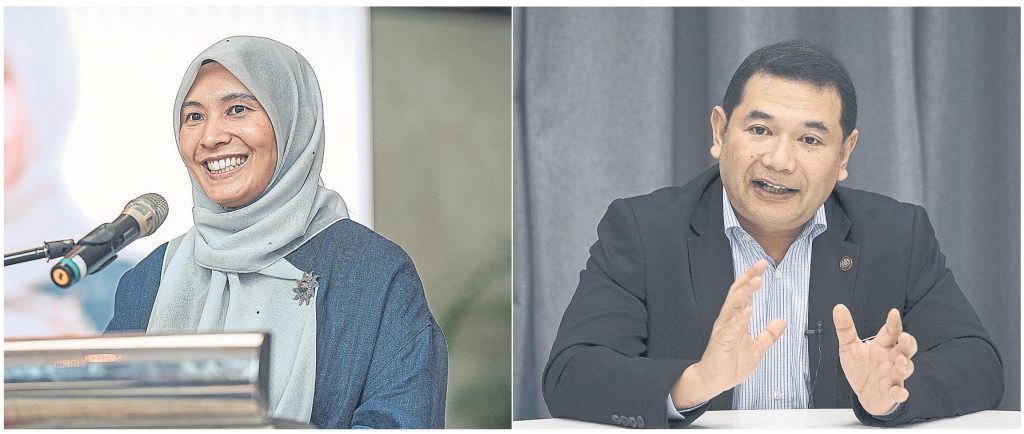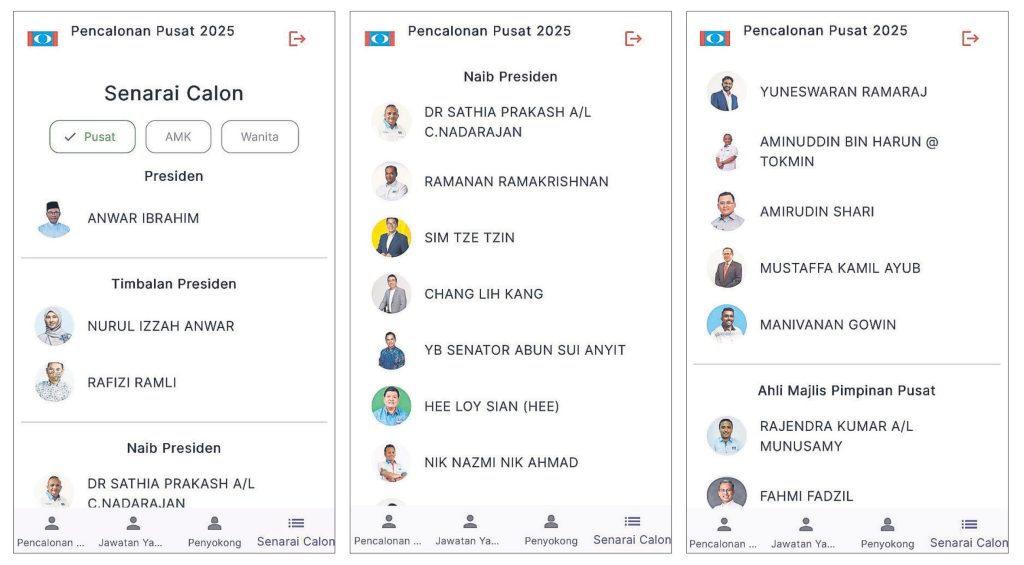
The race for the No 2 post is seen as critical test of trust in the party now anchoring Unity Govt
by RADZI RAZAK
AS PARTI Keadilan Rakyat (PKR) enters its most consequential party polls since coming to power, the race between Datuk Seri Rafizi Ramli and Nurul Izzah Anwar offers more than a clash of
personalities — it is a referendum on how far the party can go without losing what made it.
The movement began as an NGO in 1998 in the Reformasi heydays ignited by the arrest of Datuk Seri Anwar Ibrahim. In 1999, it became Parti Keadilan Nasional (PKN).
PKR emerged in 2003 when PKN merged with Parti Rakyat Malaysia (PRM) — a left-leaning social justice party that has since evolved into one of the largest political parties in the country.
While Anwar remains unchallenged as president, the race for the party’s No 2 post is seen as critical test of trust within a party now anchoring Unity Government.
Rafizi, who is defending his post, wasted no time in launching his campaign through a nationwide tour titled “Hidupkan Idealisme Reformasi Dalam Ujian Kuasa” (HIRUK), which began yesterday.
A Facebook post featuring a campaign poster introduced his core team, comprising incumbent VPs: Natural Resources and Environmental Sustainability Minister Nik Nazmi Nik Ahmad; Science, Technology and Innovation Minister Chang Lih Kang and Negri Sembilan Mentri Besar Datuk Seri Aminuddin Harun — all of whom will be defending their vice-presidency seats.
Also featured in the poster is Ampang MP Rodziah Ismail, who is once again vying for the position of Women’s Chief after losing to Education Minister Fadhlina Sidek in the previous election.
“I seek your prayers and support so that we may continue to uphold the spirit of reform, even amid the trials of power,” wrote Rafizi, who rose to his current post after defeating former PKR secretary general Datuk Seri Saifuddin Nasution Ismail in 2022.
Rafizi said HIRUK is more than a campaign as it is an opportunity to reconnect leadership with the grassroots and to remind themselves not to become complacent in the comforts of power.
The nomination for the Central Leadership were submitted online and closed at midnight on Saturday.
A grassroots member from Wangsa Maju commented on the matter, saying that Nik Nazmi – who lost in the Setiawangsa division election last month – and Rafizi have been accused of “neglecting” their grassroots due to their other responsibilities as ministers.
“Maybe now the grassroot members could see and know them better,” the party member told spoke anonymously, told The Malaysian Reserve (TMR).
“We want to see who genuinely upholds reformist ideals, not just those who speak well.
The first stop of the tour will be in the southern region, with a forum scheduled yesterday in Seremban for members from Melaka and Negri Sembilan.

With campaigning officially starting this week and voting set for 23 May, all eyes will be on the outcome of Nurul Izzah (left) – Rafizi face-off (pic: MEDIA MULIA)
Subtler Approach
In contrast, Nurul Izzah’s camp — backed by figures such as Information Chief Datuk Fahmi Fadzil, Youth Chief Adam Adli and Women’s Chief Fadhlina — has taken a more subdued yet strategic approach.
Her proposed candidacy has generated wide support from grassroots leaders across Malaysia.
In a statement issued last Friday, Nurul Izzah said her decision to contest was based by a deep commitment to strengthening the party ahead of the upcoming general election (GE).
Her participation is welcomed by grassroot members who want to see regeneration and renewal within the party, she added.
Nurul Izzah acknowledged that her return had triggered scrutiny, personal attacks and accusations.
“My decision has brought about unfounded accusations, scrutiny and personal attacks as well. I welcome all feedback, as this is the only way to continue our journey to reclaim the mantle of reforms and initiate meaningful change.
“I want to be a leader who listens. I know I cannot succeed alone. We can only do so as a team. Reform is not glamorous — it is slow, thankless, but necessary.
“While the Unity Government continues its work in office, my focus is to prepare the party for GE16 and beyond,” she said.
Nurul Izzah — who, in the party’s infancy in 1998, was known as Puteri Reformasi — added that she is offering herself as a candidate for the deputy president post not through appointment, but by contesting and seeking support from the members.
Being the party’s founding member, she insisted that her nomination this year is not because of nepotism, saying that the label has long been used to tarnish its struggle since 1998.
“When I received the highest number of votes for the vice-presidency in 2010, 2014 and 2018, the same attacks were made. These only subsided when I chose not to contest in 2022.
“Accusations of nepotism will persist. We cannot change our past or our family ties. What we can do is remain principled.
“To contest openly and receive a mandate from grassroots members is not nepotism. It is democracy,” she said.
Nurul Izzah also stressed that if elected, her main focus will be to unite and strengthen PKR’s machinery, particularly in the 50 marginal seats it must defend or win in GE16.
“The party must move forward with a structured, inclusive and strategic approach anchored in collective strength.”
Nurul Izzah, who is also a daughter to Anwar, has previously served multiple terms as VP. Her re-entry into the political frontline has generated interest both within the party and across Malaysia’s broader political landscape.
Meanwhile, Pasir Gudang MP and PKR maverick Hassan Abdul Karim has defended Nurul Izzah’s candidacy for the post, saying that the support for the former Permatang Pauh MP did not constitue nepotism within the party.
“This is not nepotism, Nurul Izzah has the merit to contest for the position of PKR deputy president,” he said last Friday.
The support received by Nurul Izzah was not requested by Anwar as party president or by his wife, Datin Seri Dr Wan Azizah Wan Ismail, who is also a former PKR president, nor by their eldest daughter. Instead, it came from the grassroots themselves.
“What right do we have to deny Nurul Izzah’s right to contest? Why deny her right just because she is Anwar’s daughter? There is no issue of nepotism. I am talking about nepotism in the party or government.
“The position (PKR deputy president) is an important one. Anwar said this is his last term; the question is, if he does not hold the presidency, who will take over?,” he asked.
This year’s internal polls are significant as they unfold while PKR is in power. The integrity of leadership, use of power and the ability to retain reformist values in office will be among key issues during the campaign.
Meanwhile, former DAP leader and Penang Deputy Chief Minister P Ramasamy weighed in on the matter, saying that although people say Nurul Izzah has the intelligence, capabil- ity and insight into managing the party and national affairs, her popularity – both during the height of the Reformasi movement and now – has largely been driven by her familial connections.
“However, one cannot deny that her political rise has been significantly aided by her family background. Had she been just an ordinary PKR member without the Anwar name, it is doubtful she would have reached her current stature,” he said in a statement.
Meanwhile, he also commented on Rafizi’s “flaws” saying the incumbent deputy president is often criticised for being out of touch with the party grassroots, and his economic ideas as economy minister seem, at times, to confound even professional economists.
“His tendency to take political leave from the party adds to questions about his long-term commitment.
“Nevertheless, Rafizi has carved out his own political identity, largely independent of party dynasties,” he added.
Ramasamy, however, concluded that despite the criticisms, Nurul Izzah might actually be a better candidate than Rafizi.
“The problem lies not in her ability but in the unavoidable shadow cast by her family connections,” he said.

The Contrast
HIRUK, seen as Rafizi’s strategic move to retain the ideological core of the party, contrasts with Nurul Izzah’s narrative of renewal rooted in collective discipline and strategic unity.
With campaigning officially starting this week and voting set for 23 May, all eyes will be on the outcome of Nurul Izzah – Rafizi face-off. Will members opt for continuity or change? Both candidates carry their own credibility and baggage.
“This year’s race is more intense than in 2022. It’s not just about personalities — it’s about the party’s direction as a ruling force,” a prominent PKR leader told TMR.
The leader who did not want to be named, said the battle is not a clash of political philosophy or personality clashes within the party, rather, it reflects how the party would want to project itself in the future.
“For Rafizi and his team, it is about defending the reformist flame in the hardest test of all: Governance. For Nurul Izzah, it is about strategic regeneration — building a resilient party for the future, grounded in principle, not privilege,” said the leader.
Battle for VP
The battle for PKR’s four VP posts has shaped up to be a tightly contested affair, bringing together a blend of seasoned incumbents and ambitious new faces — a microcosm of the party’s ongoing evolution between institutional maturity and internal renewal.
Among the incumbents defending their seats are four of the party’s most recognisable figures in government.
Aminuddin, returns with the weight of his state administration behind him, while his counterpart in Selangor, Datuk Seri Amirudin Shari, seeks to reinforce his role not just as a leader in Malaysia’s most economically strategic state, but also as a key player in PKR’s future direction.
Nik Nazmi enters the contest as a known reformist voice, while Chang continues to position himself at the intersection of innovation and institutional responsibility.
Except for Amirudin, the three other incumbents were part of Rafizi’s victorious 2022 slate and have been included in Rafizi’s HIRUK initiative.
But their challengers would also bring enough strength.
Deputy Minister of Entrepreneur Development and Cooperatives, Datuk R Ramanan, has stepped forward with a campaign that leans heavily on economic empowerment and Tamil grassroots support.
He is joined by Bayan Baru MP Sim Tze Tzin, a steady hand with roots in agricultural reform and Segamat MP R Yuneswaran, who has made inroads in southern Johor and among the younger ranks.
Hulu Selangor branch chief and PKR deputy secretary general Dr Sathia Prakash Nadarajan, enters as a dark horse, leveraging his organisational experience and professional background as a medical doctor.
Also in the race are Hee Loy Sian, a former Selangor exco with a strong environmental record, Senator Abun Sui Anyit from Sarawak, known for his advocacy of native land rights and Mustaffa Kamil Ayub — a familiar name from earlier PKR struggles, now seeking a return to national leadership.
Beyond the vice-presidency, the race for 20 Central Leadership Council (MPP) seats has attracted 72 hopefuls.
Among them are big names in the Cabinet like Fahmi and three deputy ministers — Adam Adli Abdul Halim, Akmal Nasir Nasrullah and K Saraswathy — alongside outsiders like former Education Minister Maszlee Malik and celebrity-turned-candidate Datuk Hans Isaac.
Their participation shows that this PKR election will not only be about legacy and loyalty, but about who gets to chart the party’s path to GE16 and beyond.
- This article first appeared in The Malaysian Reserve weekly print edition
The post Between reform and power: PKR’s struggle to stay true appeared first on The Malaysian Reserve.
